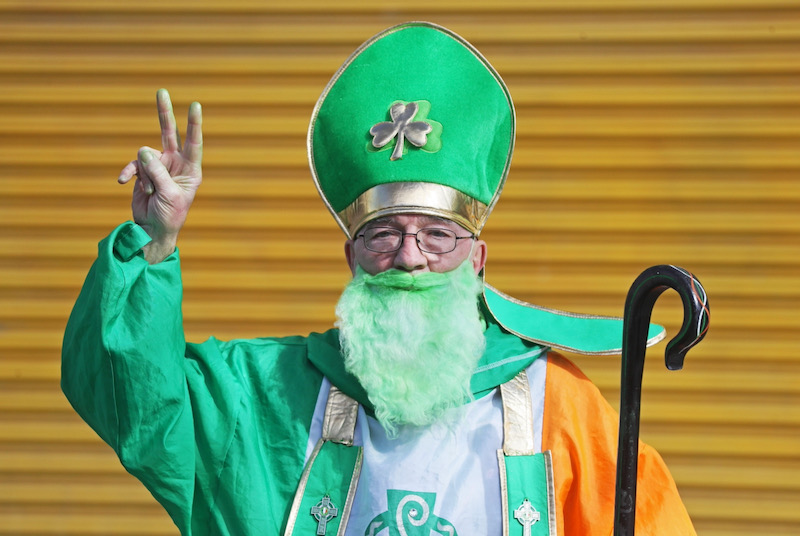Archbishop Dermot Farrell of Dublin has called on the public authorities in Ireland to prioritise people’s constitutional right to worship when Covid restrictions are eased on 5 April.
In his homily for St Patrick's Day delivered at St Patrick’s Church, Ringsend in Dublin, Archbishop Farrell said it was a matter of “human dignity and fairness” that people would be given the assurance that their legitimate desire to gather responsibly to worship would be prioritised
He strongly criticised the current restriction on attendance at funerals to 10 people as “harsh and unfair”.
“Close family members are frequently denied the right to be present in Church at the funeral of their loved ones: at times, people who have been with the deceased for years. This is tolerable only in the most extreme circumstances, and for the shortest possible period.”
His comments were made as the bishops of Northern Ireland announced that public worship will resume there from Friday 26 March.
The five bishops of Northern Ireland said guidelines for the liturgies of Holy Week in a time of pandemic would be issued to parishes over coming days.
In a statement on Wednesday, Bishops Eamon Martin, Noel Treanor, Donal McKeown, Larry Duffy and Michael Router said that throughout the pandemic, “our parishes have provided a real life-line of hope and solidarity to many in our local communities, including some of the most vulnerable”.
Referring to the traditional popularity of confession at Easter, the bishops said that it may not be possible for all to safely avail of the sacrament of reconciliation and they encouraged the faithful to make an Act of Perfect Contrition instead.
South of the border, churches remain will remain closed for Easter under level five restrictions. The Irish Bishops’ Conference last week highlighted their concerns that the government’s current programme of restrictions will prevent churches reopening for public worship until the country moves to level two, which could takes months.
In his homily on Wednesday, Archbishop Farrell acknowledged that the Church in Ireland was celebrating the feast day of their patron saint “in the strangest of times”.
“This past year has been a tumultuous one for people of faith with all churches closed over many months for public worship,” he said.
He said the Church and other faith communities have been vocal and clear in emphasising the civic and moral duty to promote the common good by observing public health guidelines.
“The planned exit from the current severe restrictions is being watched by many citizens who expect their religious practice to be respected by the public authorities, and not be subordinated to commercial interests. This is a matter of health and wellbeing for many. Health, as we discover again and again, is not just a matter of avoiding disease, it is a matter of how we are in ourselves, it involves our emotions and our mental health.”
Dr Farrell also referred to the right to public worship which is protected by Article 44 of the constitution.
He said the number who are allowed to worship cannot be “randomly determined as if were some mathematical formula. This is about people: the protection of people’s health, and the fostering of people’s wellbeing.
“While a balance must be struck, easing restrictions on worship has a better founded statutory claim than other activities which may be pressed by powerful commercial interests.
“Worship has a clear human priority over other activities that do not possess that priority of themselves.”
He also said that whenever public worship was permitted, parishes have been diligent in operating within guidelines, with great commitment by staff and volunteers to stewarding, sanitising and managing attendance.
“For many people, being denied the opportunity to attend Mass and receive Holy Communion has been difficult: it has affected how they are nourished and sustained by their faith. Let us not underestimate the consequences of this in people’s lives.”
Separately, the leader of the Irish Church, Archbishop Eamon Martin, acknowledged that for the second year running, celebrations of the Feast of St Patrick have been curtailed by Covid-19 restrictions.
Consequently, the traditional parades, parties, and the usual big sporting events have had to be cancelled or postponed. Even the White House presentation of the bowl of shamrock has gone virtual, he noted.
In his St Patrick’s Day address, Archbishop Martin said that down the centuries many customs, myths and paraphernalia have grown up around St Patrick and the celebration of his feast day at home and abroad.
“But perhaps, paradoxically, the restrictions this year are opening up an opportunity for us to focus a little more on St Patrick himself, and even rescue the real St Patrick from the legends and distractions surrounding him.”
Referring to the current challenges, he said he was praying for those struggling after contracting the Covid19 virus or having to isolate; those in hospital and intensive care; those whose jobs or livelihoods have been threatened and those exhausted from caring and worrying.
He was also thinking of those who are far away on St Patrick’s Day or in hospital or care, or otherwise unable to join their families.
The Archbishop of Armagh also spoke about Ireland, north and south, “at this pivotal moment in our shared history, a time when we look back one hundred years: to separation and partition on this island and all that has happened to divide, grieve and polarise us”.
The Church leader paid tribute to the achievements and progress of Irish people, and the possibilities for lasting peace and reconciliation “for harnessing the beauty and uniqueness of our land, and for building relationships that will bring us closer together rather than divide us”.



 Loading ...
Loading ...